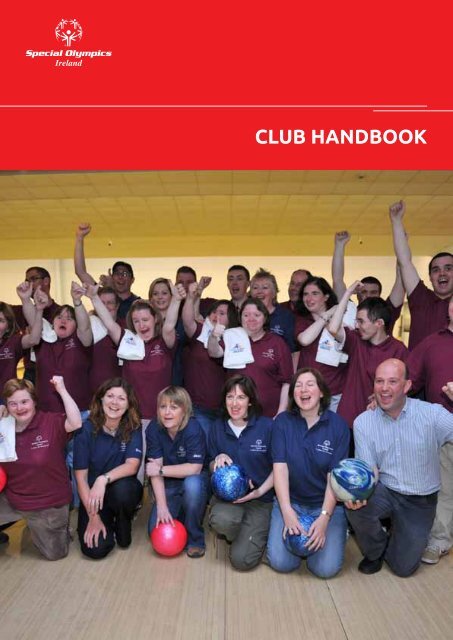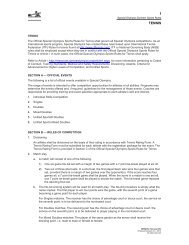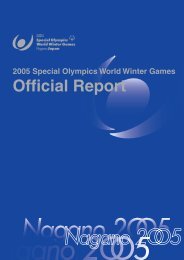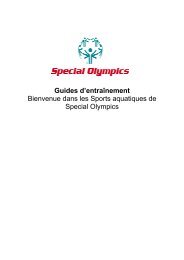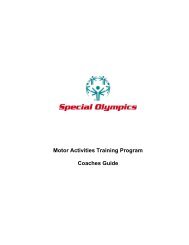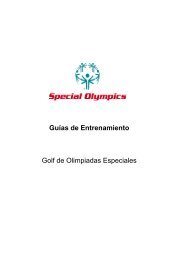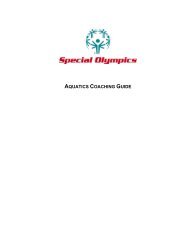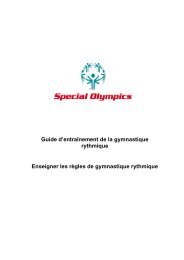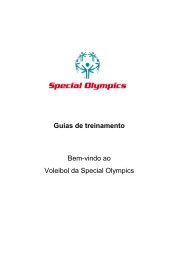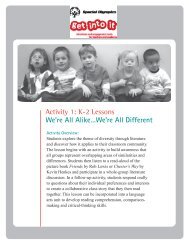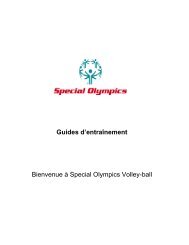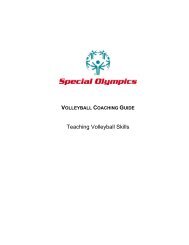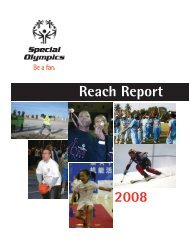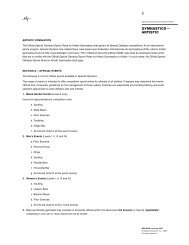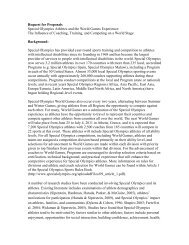CLUB HANDBOOK - Special Olympics Ireland
CLUB HANDBOOK - Special Olympics Ireland
CLUB HANDBOOK - Special Olympics Ireland
You also want an ePaper? Increase the reach of your titles
YUMPU automatically turns print PDFs into web optimized ePapers that Google loves.
<strong>CLUB</strong> <strong>HANDBOOK</strong>
Content<br />
Section 1 - Introduction<br />
<strong>Special</strong> <strong>Olympics</strong> <strong>Ireland</strong> ........................................................................................................................... 4<br />
Our mission ................................................................................................................................................. 4<br />
Our vision .................................................................................................................................................... 4<br />
Our membership ........................................................................................................................................ 5<br />
Our support structures ............................................................................................................................. 5<br />
Section 2 - Club Management Team<br />
Structure...................................................................................................................................................... 8<br />
Sub Committees and Assistants .............................................................................................................. 9<br />
How should a Club Management Team operate .................................................................................. 9<br />
Training for Club Management Team members .................................................................................11<br />
Club Management Team roles and responsibilities ...........................................................................12<br />
Section 3 - Administration in your Club<br />
Registration ..............................................................................................................................................15<br />
Affiliation ...................................................................................................................................................16<br />
Club representation ................................................................................................................................17<br />
Planning .....................................................................................................................................................17<br />
Venue .........................................................................................................................................................17<br />
Use of the <strong>Special</strong> <strong>Olympics</strong> logo ..........................................................................................................18<br />
Club uniforms ...........................................................................................................................................20<br />
Health and safety .....................................................................................................................................21<br />
Finance and fundraising ..........................................................................................................................22<br />
Insurance ...................................................................................................................................................23<br />
Communication ........................................................................................................................................25<br />
Section 4 - The Sports<br />
Sports rules ...............................................................................................................................................27<br />
Sports offered by <strong>Special</strong> <strong>Olympics</strong> <strong>Ireland</strong> ........................................................................................27<br />
Minimum Coaching Standards in your Club ........................................................................................28<br />
Minimum Training Guidelines for Clubs ...............................................................................................28<br />
Running your training session ...............................................................................................................29<br />
Coach education ......................................................................................................................................31<br />
Competition ..............................................................................................................................................32<br />
Section 5 - Developing your Club<br />
Developing your sports ...........................................................................................................................35<br />
Developing membership ........................................................................................................................37<br />
Increasing volunteer numbers ...............................................................................................................37<br />
Adding a new <strong>Special</strong> <strong>Olympics</strong> Programme.......................................................................................38<br />
List of Appendices ...........................................................................................................................................40<br />
<strong>Special</strong> <strong>Olympics</strong> <strong>Ireland</strong> Club Handbook | Page 2
Section 1<br />
Introduction
<strong>Special</strong> <strong>Olympics</strong> <strong>Ireland</strong><br />
INTRODUCTION<br />
• <strong>Special</strong> <strong>Olympics</strong> <strong>Ireland</strong><br />
• Our Mission<br />
• Our Vision<br />
• Our Membership<br />
• Our Support Structures<br />
<strong>Special</strong> <strong>Olympics</strong> provides year-round sports training and competition opportunities for people<br />
with an intellectual disability. The <strong>Special</strong> <strong>Olympics</strong> programme is offered as an All-<strong>Ireland</strong> programme<br />
and is sub-divided into five regional programmes.<br />
The organisation offers training and competition at various stages of development in 15 official sports<br />
- alpine skiing, aquatics, athletics, basketball, badminton, bocce, bowling, equestrian, floorball, football,<br />
gymnastics, golf, kayaking and table tennis. In addition, pitch and putt, a locally popular sport is offered.<br />
Athletes may participate in a training programme from six years of age and compete from eight years<br />
of age; there is no upper age limit. A comprehensive Motor Activities Training Programme (MATP) is offered<br />
for athletes who do not have the required skill level as yet to compete under <strong>Special</strong> <strong>Olympics</strong> or<br />
National Governing Body Rules.<br />
The Official <strong>Special</strong> <strong>Olympics</strong> Sports Rules govern all <strong>Special</strong> <strong>Olympics</strong> competition. These rules are<br />
based on the relevant International Federation and the rules of each individual country’s National Governing<br />
Body (NGB) of sport.<br />
<strong>Special</strong> <strong>Olympics</strong> is unique in that it offers a programme of sport for all levels of ability. Athletes or<br />
teams are grouped in divisions to ensure fair competition and each athlete or team is recognised for<br />
his/her performance with medals awarded for first through to third place, and ribbons for fourth<br />
through to eighth place. Competition is offered at area, regional and national level, with an opportunity<br />
to progress to international competition. A number of leagues and inter club events are organised<br />
locally throughout the year that offer additional competitive opportunities to athletes to develop.<br />
Our Mission<br />
The mission of <strong>Special</strong> <strong>Olympics</strong> <strong>Ireland</strong> is “to provide year-round sports training and athletic competition<br />
in a variety of olympic-type sports for children and adults with an intellectual disability, giving them<br />
continuing opportunities to develop physical fitness, demonstrate courage, experience joy and participate<br />
in a sharing of gifts, skills and friendships with their families, other <strong>Special</strong> <strong>Olympics</strong> athletes and<br />
the community.”<br />
Our Vision<br />
The long term vision is to build a sustainable <strong>Special</strong> <strong>Olympics</strong> <strong>Ireland</strong><br />
programme so that every person with an intellectual disability has the<br />
opportunity, in their local community, to participate in high quality sport<br />
and development activities that bring life-changing experiences of increased<br />
skills, self-confidence and joy.<br />
<strong>Special</strong> <strong>Olympics</strong> <strong>Ireland</strong> Club Handbook | Page 4<br />
“Let me win<br />
but if I cannot win,<br />
Let me be brave<br />
in the attempt.<br />
- <strong>Special</strong> <strong>Olympics</strong> Athlete Oath
Our Membership<br />
Athletes<br />
Participation as an athlete in the <strong>Special</strong> <strong>Olympics</strong> programme is open to children and adults with an<br />
intellectual disability. Athletes may take part in sports training from the age of 6 years, sports competition<br />
from 8 years of age and there is no upper age limit.<br />
Volunteers<br />
The <strong>Special</strong> <strong>Olympics</strong> programme is supported by thousands of volunteers who undertake numerous<br />
roles within the organisation and they are the true backbone of the organisation. Volunteering options<br />
are open to persons over the age of 15 who successfully register with <strong>Special</strong> <strong>Olympics</strong> <strong>Ireland</strong>. On<br />
reaching the age of 16, the person is also subject to a background check which will be undertaken by<br />
the appropriate authority in the Republic or in the North of <strong>Ireland</strong>.<br />
Family Members<br />
Family members of the athletes are welcomed and encouraged to play an active role in supporting athletes<br />
and <strong>Special</strong> <strong>Olympics</strong>. A family member is defined as a parent, sibling, legal guardian, immediate<br />
carer or spouse of an athlete.<br />
Participation of Siblings in the Club<br />
<strong>Special</strong> <strong>Olympics</strong> is a sports training and competition programme for people with an intellectual disability<br />
and as such the focus of training must be for them. However, in some instances, it may be of benefit<br />
to the athletes and the club as a whole to permit a brother or sister to participate in training provided:<br />
1. They are given no responsibility<br />
2. They are under the direction and control of the coach taking the training session<br />
3. The focus of the session must remain on the athletes.<br />
Our Support Structures<br />
Local Level<br />
Sports training and coaching is provided for athletes, on a weekly basis, in local <strong>Special</strong> <strong>Olympics</strong> clubs.<br />
This year-round sports programme of activities is organised by volunteers from within the local community.<br />
A small team of volunteers sit on the Club Management Team which has the responsibility for<br />
the effective running of the club. The Club Management Team work closely with all its volunteers to<br />
provide:<br />
• Sports training and competition opportunities<br />
• A safe secure environment<br />
• FUN & friendship!<br />
The long-term aim of the <strong>Special</strong> <strong>Olympics</strong> programme is to promote the all-round development of the<br />
individual, integrating the person into local communities and giving him/her opportunities for personal<br />
development and achievement. All this may be achieved by becoming a member of a <strong>Special</strong> <strong>Olympics</strong><br />
Club.<br />
Club is any group established to run a<br />
<strong>Special</strong> <strong>Olympics</strong> sports programme,<br />
i.e. community groups, intellectual disability<br />
service providers and special schools.<br />
<strong>Special</strong> <strong>Olympics</strong> <strong>Ireland</strong> Club Handbook | Page 5
Regional Level<br />
Each <strong>Special</strong> <strong>Olympics</strong> Club is located within one of the 5 regions within <strong>Special</strong> <strong>Olympics</strong> <strong>Ireland</strong>:<br />
• Connaught<br />
• Eastern<br />
• Leinster<br />
• Munster<br />
• Ulster<br />
Each region has a regional office, where a team of staff and volunteers, in conjunction with a Regional<br />
Committee, organise and manage the <strong>Special</strong> <strong>Olympics</strong> programme in the region and provide support<br />
to athletes, volunteers and clubs. Due to their size, some regions are further divided up into Areas for<br />
competition, communication and support.<br />
For a list of your regional contacts refer to the appendices.<br />
All <strong>Ireland</strong> Level<br />
<strong>Special</strong> <strong>Olympics</strong> <strong>Ireland</strong> is governed by a Board of Directors which has responsibility for overseeing, directing<br />
and co-ordinating the organisation, its policies, affairs and activities of <strong>Special</strong> <strong>Olympics</strong> <strong>Ireland</strong>.<br />
Day-to-day management of the organisation is delegated to the Chief Executive Officer, who works<br />
with a team of staff and volunteers to manage and deliver the programme.<br />
Where your club fits in<br />
Purpose of this Club Handbook<br />
The purpose of this club handbook is to act as a guide for all clubs to:<br />
• Outline minimum standards of safe operation<br />
• Provide guidelines for best practice<br />
• Offer helpful hints and tips<br />
• Inform on policy and procedure<br />
AREA<br />
YOUR<br />
<strong>CLUB</strong><br />
BOARD OF DIRECTORS & CENTRAL OFFICE<br />
REGIONAL COMMITTEE & REGIONAL OFFICE<br />
<strong>Special</strong> <strong>Olympics</strong> <strong>Ireland</strong> Club Handbook | Page 6
Section 2<br />
Club Management Team
<strong>CLUB</strong> MANAGEMENT TEAM<br />
• Structure<br />
• Sub Committees and Assistants<br />
• How should a Club Management Team operate<br />
• Training for Club Management Team members<br />
• Club Management Team roles and responsibilities<br />
STRUCTURE<br />
Running a club requires coordination, communication and organisation and a structured approach in<br />
the delivery of the activities. In this regard, each club must put in place a Club Management Team. The<br />
structure for the Club Management Team is outlined below.<br />
The roles shown in shaded boxes are required in every community-run club. The non-shaded boxes<br />
represent roles that are recommended to be put in place when a club has reached a stage where they<br />
are appropriate and necessary for the club’s continued development.<br />
In a club where there is only one sport offered (single-sport club), the Head Coach is a member of the<br />
Management Team. Where there are a number of sports in a club (a multi-sport club), the Head Coaches<br />
will appoint a Sports Officer to represent the sport and the coaches on the Club Management Team.<br />
A volunteer may only undertake one role within the club management structure in any given year.<br />
Most clubs will need additional help from volunteers to run their weekly training sessions and other<br />
club activities. The ratio of coaches, assistant coaches or volunteers should be one volunteer to every<br />
four athletes. This ratio may need to be higher if some athletes need greater support.<br />
Why have a team structure?<br />
A team structure ensures:<br />
• A shared workload<br />
• Defined roles and responsibilities<br />
• Clarity for everyone involved<br />
• A solid support structure<br />
• A reduction in duplication of effort<br />
• A platform for future growth<br />
<strong>Special</strong> <strong>Olympics</strong> <strong>Ireland</strong> Club Handbook | Page 8
SUB-COMMITTEES AND ASSISTANTS<br />
A Club Management Team may form a sub-committee, from time to time, to undertake a particular<br />
function or project that has specific defined goals, e.g. a fundraising event. A sub-committee will be<br />
led by a member of the Club Management Team, who will coordinate the subcommittee and report on<br />
progress.<br />
The Club Management Team may also appoint assistants to any of the roles in order to assist the officer<br />
in undertaking his/her task.<br />
HOW SHOULD A <strong>CLUB</strong> MANAGEMENT TEAM OPERATE?<br />
Regular Meetings<br />
The most effective way of running your club is to schedule regular meetings of the Club Management<br />
Team to discuss club business.<br />
Regular meetings promote effective communication, increase awareness of knowledge and developments<br />
and provide a platform for addressing challenges. Some key steps to ensuring that meetings are<br />
effective include:<br />
• Establishing a regular pattern – i.e. the 1st Wednesday of every month<br />
• Setting an agenda – consult with the others<br />
• Circulating the agenda in advance, including time and location<br />
• Starting on time and ending on time<br />
• Recording and circulating the minutes<br />
• Following up on actions arising from the meeting<br />
Minutes of Club Management Team meetings may be kept confidential to the committee but should be<br />
recorded and stored appropriately for future reference and for historical records in the lifetime of the<br />
club.<br />
Club Management Team members should be mindful that Data Protection legislation permits an individual<br />
to request a copy of any written information pertaining to that individual to be made available, if<br />
so requested.<br />
All officers on a Club Management Team must make every effort to ensure that information regarding<br />
athletes, families and volunteers is treated in a careful and sensitive manner and discussed only with<br />
those who need to know in accordance with <strong>Special</strong> <strong>Olympics</strong> <strong>Ireland</strong> policies.<br />
<strong>Special</strong> <strong>Olympics</strong> <strong>Ireland</strong> Club Handbook | Page 9<br />
Annual General Meeting<br />
Once a year, not later than the end of November,<br />
the Club Management Team should hold an Annual<br />
General Meeting (AGM) for all club members.<br />
The purpose of the AGM is to elect the Club Management<br />
Team, inform the members of previous<br />
and future activities, allows members to receive<br />
the club accounts and to have an opportunity to<br />
provide input and feedback on the club’s activities.<br />
Roles on the Club Management Team are filled by<br />
either elections or appointments.
Elections<br />
All Officers shall be elected at the Annual General Meeting of the Club<br />
Members of the Club Management Team are elected or appointed through:<br />
1. Open election:<br />
The Chairperson, Secretary and Treasurer position is elected by the members at the Club Annual<br />
General Meeting.<br />
2. Closed Election:<br />
Athlete Representative: The Athlete representative should be elected by the ALPs athletes.<br />
Where an ALPs Programme does not yet exist within the club, the Club Management Team may<br />
co-opt an athlete.<br />
3. Co-option:<br />
i. Sport: In a single sport club, the Head Coach will be on the Management Team. In a<br />
multi-sport club, Head Coaches should appoint a Sports Officer to represent them on the<br />
Club Management Team.<br />
ii. Athlete Protection Officer/ Medical Representative: This position may be appointed by<br />
the Club Committee on the basis of their suitability for the role.<br />
iii. Membership Officer: This position may be appointed by the Club Committee on the basis<br />
of their suitability for the role.<br />
iv. Public Relations (PR) Officer: This position may be appointed by the Club Committee on<br />
the basis of their suitability for the role.<br />
v. ALPs Officer: The ALPs Officer, where the role exists, will be on the Club Management<br />
Team.<br />
vi. All proposals for co-option must be approved by the Club Committee and be in accordance<br />
with the structure as outlined by <strong>Special</strong> <strong>Olympics</strong>.<br />
Term of Office<br />
Officer roles at every level of the organisation are for a<br />
two-year term, at the end of which the person is eligible<br />
to put themselves forward for the role for a further two<br />
years. Again at the end of the 4th year, a person may<br />
put themselves forward for another two years, but the<br />
maximum consecutive term in a role or combination of<br />
roles on a team or committee is six years. A gap of one<br />
year is required after the maximum term.<br />
An individual’s term is subject to review and/or cessation<br />
at any time, either by the committee/team that<br />
elected or appointed the person, or if necessary by<br />
<strong>Special</strong> <strong>Olympics</strong> <strong>Ireland</strong>. Extensions to the maximum<br />
term will be considered by <strong>Special</strong> <strong>Olympics</strong> <strong>Ireland</strong> in<br />
exceptional circumstances only – the aim is to encourage<br />
regular rotation of team and committee members.<br />
<strong>Special</strong> <strong>Olympics</strong> <strong>Ireland</strong> Club Handbook | Page 10
TRAINING FOR <strong>CLUB</strong> MANAGEMENT TEAM MEMBERS<br />
When a club is initially established, training and support is provided throughout its first year by their<br />
<strong>Special</strong> <strong>Olympics</strong> Regional Office. A Club Management Team will receive ongoing support, where required,<br />
from the appropriate Development Officer within their region. It is also recommended that the<br />
club organises role-specific and “on-the-job” training for any new officer filling a role and ensure that<br />
there is a proper handover within the role.<br />
Training falls into two categories, mandatory and recommended as outlined in the table below:<br />
Course Mandatory Recommended Where to access training<br />
<strong>Special</strong> <strong>Olympics</strong><br />
Volunteer Induction<br />
• Club Management<br />
Team<br />
• All Volunteers<br />
Club Management Team<br />
Training<br />
Code of Ethics • Athlete Protection<br />
Officer<br />
• Head Coaches<br />
Introduction to Coaching<br />
Practices<br />
• Assistant Coaches<br />
Intellectual Disability<br />
Modules<br />
Appropriate Sports<br />
Specific Coaching Qualification<br />
(National Governing<br />
Body [NGB] or <strong>Special</strong><br />
<strong>Olympics</strong> <strong>Ireland</strong> for<br />
bocce and golf)<br />
• Head Coach<br />
Level of<br />
qualification will<br />
vary depending on<br />
the NGB<br />
• Family members • Online at<br />
http://moodle.specialolympics.<br />
ie/moodle<br />
• Details of Tutor led local courses<br />
available on the website for each<br />
region at<br />
www.specialolympics.ie<br />
• Regional Office<br />
• Club Management<br />
Team<br />
• Regional Office<br />
• Chairperson<br />
• Volunteers<br />
• Family members<br />
• Any volunteers<br />
new to a coaching<br />
role<br />
• Club Management<br />
Team<br />
• Assistant Coaches<br />
• Volunteers<br />
<strong>Special</strong> <strong>Olympics</strong> <strong>Ireland</strong> Club Handbook | Page 11<br />
• Local Sports Partnership<br />
• Sport NI<br />
• Regional Office<br />
• Regional office<br />
• training@specialolympics.ie<br />
• muireann.niriain@specialolympics.ie<br />
• Regional Office<br />
Assistant Coaches • Regional Office or specific NGB
<strong>CLUB</strong> MANAGEMENT TEAM ROLES AND RESPONSIBILITIES<br />
Chairperson<br />
• Act as the overall leader of the management team running the club<br />
• Be the primary representative of the club in dealings with all outside bodies and act as its spokesperson<br />
wherever appropriate<br />
• Ensure the club’s activities are in line with <strong>Special</strong> <strong>Olympics</strong> rules, policies and procedures<br />
• Ensure that the club’s activities are conducted safely and that collective responsibility for safety is<br />
emphasised at all levels<br />
• Lead club fundraising activities<br />
• Oversee the appropriate management of club accounts<br />
Secretary<br />
• Assist with all aspects of club administration<br />
• Prepare agendas and communicate notice of meetings<br />
• Follow up on actions from meetings with people assigned the actions<br />
• Act as a conduit for communications in to, out of and within the club<br />
Membership Officer<br />
• Responsible for the administration associated with club members, athletes, volunteers and family<br />
members<br />
• Ensure that all new members are welcomed into the club, appropriately registered, assigned and<br />
trained where necessary<br />
• Update relevant forms and submit them on time for annual affiliation<br />
• Responsible for recognition duties within the club for volunteers<br />
Head Coach (single-sport club)<br />
• Lead sports training and competition activities<br />
• Act as the main point of contact for sport in the club<br />
• Represent the view of coaches to the management team<br />
• Must have a sports specific qualification in line with <strong>Special</strong> <strong>Olympics</strong> <strong>Ireland</strong> requirements<br />
Sports Officer (multi-sport club)<br />
• Act as the main point of contact for sport in the club<br />
• Represent the view of coaches to the management team<br />
• Represent Head Coaches for each sport<br />
• Work with Head Coaches to coordinate sports needs and activities from an overall perspective<br />
within the club.<br />
• Must have an appropriate coaching qualification<br />
in line with <strong>Special</strong> <strong>Olympics</strong> <strong>Ireland</strong><br />
requirements<br />
<strong>Special</strong> <strong>Olympics</strong> <strong>Ireland</strong> Club Handbook | Page 12
Athlete Protection and Medical Officer<br />
• Oversee and coordinate the adoption and implementation<br />
of the Code of Ethics & Good Practice by the club’s<br />
members<br />
• Act as a point of contact for information and for reporting<br />
of alleged incidents related to athlete protection<br />
• Promote the health and well-being of athletes participating<br />
in <strong>Special</strong> <strong>Olympics</strong> training at the club<br />
• Ensure Athlete Participation Forms are held on-site by<br />
coaches for all training sessions and competitions<br />
• Ensure adequate first aid cover is provided for all training<br />
sessions<br />
• Must have either Basic Awareness - Code of Ethics and<br />
Good Practice for Children’s Sport (IRL) or Safeguarding<br />
Children and Young People in Sport (Basic awareness<br />
raising) (NI) and must also attend Children’s Officer training<br />
(IRL) or Designated Safeguarding Children’s Officer<br />
(NI) within the first year of their first term<br />
Treasurer<br />
• Manage club income and expenditure in conjunction with the Chairperson<br />
• Ensure all club transactions are transparent and accountable at all times<br />
• Produce regular statements of accounts<br />
• Budgeting, in conjunction with the Chairperson<br />
Additional Roles & Responsibilities<br />
Coaches/Assistant Coaches assist the Head coach to:<br />
• Implement a planned and structured programme of regular training for athletes<br />
• Proactively work with athletes to develop their full potential<br />
• Support and facilitate athlete participation in regular competitive opportunities<br />
• Monitor athletes at all times to ensure their safety<br />
• Must have an appropriate coaching qualification in line with <strong>Special</strong> <strong>Olympics</strong> <strong>Ireland</strong> requirements<br />
Athlete Representative<br />
• Actively seek the views of fellow athletes<br />
• Feedback on athlete views to the Club Management Team<br />
• Participate in management team discussions and decision-making<br />
Athlete Leadership Programme Officer<br />
• Encourage broader athlete participation in the running of the club<br />
• Coordinate implementation of the ALPs programme<br />
• Recruit ALPs mentors for athletes<br />
• Plan an appropriate ALPs programme for the club<br />
Public Relations Officer<br />
• Identify PR opportunities and plan year-round promotion of the club<br />
• Develop good relationships with local media<br />
• Help with planning and promoting club fundraising events<br />
<strong>Special</strong> <strong>Olympics</strong> <strong>Ireland</strong> Club Handbook | Page 13
Section 3<br />
Administration in your club
ADMINISTRATION IN YOUR SPECIAL OLYMPICS <strong>CLUB</strong><br />
• Registration<br />
• Affiliation<br />
• Club Representation<br />
• Planning<br />
• Venue<br />
• Use of the <strong>Special</strong> <strong>Olympics</strong> Logo<br />
• Club uniforms<br />
• Health and Safety<br />
• Finance and Fundraising<br />
• Insurance<br />
• Communication<br />
In order to run your club effectively, you should put systems in place to manage the administration and<br />
other requirements associated with running your club.<br />
REGISTRATION<br />
Registration procedures are in place for<br />
• Athletes<br />
• Club<br />
• Volunteers<br />
• Family members<br />
The Membership Officer should keep an up-to-date record of all club members.<br />
Due care should be taken at all times to ensure that data on any club member is held in a safe and secure<br />
location and all data is appropriately protected.<br />
Athlete Registration<br />
To participate as an athlete within <strong>Special</strong> <strong>Olympics</strong>, an individual must:<br />
1. Complete and submit to the Regional Office an Athlete Participation Form to become a registered<br />
athlete<br />
2. Become a member of a <strong>Special</strong> <strong>Olympics</strong> Club<br />
Athlete Participation Forms must be present at every <strong>Special</strong> <strong>Olympics</strong> activity in which the athlete is<br />
participating.<br />
All athletes completing registration, which includes the submission of a photograph, will receive a photographic<br />
membership card.<br />
Athletes should only have one Athlete Participation Form in circulation, the original of which should be<br />
held by the athlete or family member and a copy held by his/her Club Membership Officer. If an athlete<br />
is joining more than one club, a copy of the most up to date Athlete Participation Form should be made<br />
by the family and given to the new club, rather than creating a second form. Any change to medical<br />
information must be updated as soon as it is known.<br />
* See appendices<br />
<strong>Special</strong> <strong>Olympics</strong> <strong>Ireland</strong> Club Handbook | 15
Volunteer Registration<br />
All volunteers taking part in any club activity must be fully registered with <strong>Special</strong> <strong>Olympics</strong> <strong>Ireland</strong>. This<br />
may be done in one of two ways:<br />
1. Apply online at www.specialolympics.ie or<br />
2. Complete a hard copy application form and the relevant Vetting Form, see appendices<br />
Volunteering is open to persons over the age of 15 and all volunteers must apply to <strong>Special</strong> <strong>Olympics</strong><br />
<strong>Ireland</strong> to register. As part of application, volunteers over 16 years of age are subject to vetting, which<br />
is undertaken by the appropriate authority either the Gardaa Síochána (Republic of <strong>Ireland</strong>) or AccessNI<br />
(Northern <strong>Ireland</strong>). Volunteers may also be subject to a reference check.<br />
Every new volunteer applicant will receive notification from <strong>Special</strong> <strong>Olympics</strong> <strong>Ireland</strong> when they are successfully<br />
registered (i.e. application and background check complete). It is not possible to volunteer in<br />
any capacity for <strong>Special</strong> <strong>Olympics</strong> <strong>Ireland</strong> without becoming fully registered.<br />
Photographic Volunteer Membership Cards are issued to new volunteers when the volunteer’s assignment<br />
is confirmed (i.e. club/event/committee role) and when a photograph has been provided. Newly<br />
registered volunteers should be asked to show proof of their registration when first joining the club<br />
by producing their photographic membership card or formal letter confirming that they are fully registered.<br />
Remember<br />
Clubs who have non registered volunteers are taking a risk in relation to the safety of its members and<br />
their non-registered volunteers are not covered by <strong>Special</strong> <strong>Olympics</strong> Insurance.<br />
Family Registration<br />
For each athlete registered, <strong>Special</strong> <strong>Olympics</strong> requires a designated contact person from the athlete’s<br />
family or his/her carer. This person will be the official point of contact for any direct communication in<br />
relation to the athlete, if and when direct contact is required.<br />
Other family members may also register by giving their details to their Regional Office or at Family<br />
Information stands at events. Family members wishing to take on a role within a club must register as a<br />
volunteer, following the process outlined in the volunteer registration section.<br />
AFFILIATION<br />
Club Annual Affiliation<br />
Every club must affiliate to <strong>Special</strong> <strong>Olympics</strong> <strong>Ireland</strong> on an annual basis. Annual Affiliation takes place<br />
between September and October every year and is a mandatory requirement for participation in the<br />
<strong>Special</strong> <strong>Olympics</strong> <strong>Ireland</strong> programme.<br />
Athlete and Volunteer Annual Affiliation<br />
Each year, a full list of registered athletes and volunteers will be sent to your club. This list should be<br />
checked against your records to ensure all information is accurate. Any missing names must be followed<br />
up to ensure the athlete or volunteer is fully registered and/or assigned to your specific club.<br />
<strong>Special</strong> <strong>Olympics</strong> <strong>Ireland</strong> Club Handbook | 16
<strong>CLUB</strong> REPRESENTATION<br />
Over the course of each year club members will be invited to attend meetings and sessions within their<br />
area, region and/or <strong>Special</strong> <strong>Olympics</strong> <strong>Ireland</strong>. Representation at these meetings will ensure that your<br />
club receives relevant updates and new information on developments and that you will have an opportunity<br />
to input and give feedback. Area or Regional meetings allow members of clubs to meet each<br />
other, exchange ideas and experience and share information.<br />
PLANNING<br />
Planning is vital to build a successful and progressive club. Clubs should always plan in the short to medium<br />
term (e.g. 6 months to a year) but must also look at long-term plans.<br />
Why plan?<br />
• Identify activities for coming period<br />
• Helps to identify required finances<br />
• Creates a pathway for growth and<br />
development<br />
• Ensures everyone is going in the same<br />
direction<br />
• Provides a focus<br />
• Supports funding applications<br />
VENUE<br />
Venue Hire<br />
Every club needs somewhere to train and for some sports you may need more than one venue, e.g.<br />
indoor and outdoor, multi-sports, etc. The relationship that you have with your venue will be critical to<br />
the success of the club.<br />
When using or hiring a training venue<br />
• Ask for a copy of the Safety Statement for the facility (seek advice as to whether any amendments<br />
may be required in order to suit your needs and your use of the venue)<br />
• Ask for a copy of the Insurance policy for the venue<br />
• Confirm a Venue Hire agreement in writing<br />
• Ensure the venue is accessible in relation to toilets, rest/recreational areas as well as to the sports<br />
area<br />
• Ensure there are adequate toilet/shower facilities<br />
• Assess the available area for storage of equipment, if required<br />
Many clubs may be fortunate enough to be offered a venue free of charge, but, if that is not an option,<br />
a preferential rate should be negotiated.<br />
Tips on developing a good working relationship with the management of the venue<br />
• Always leave the venue as you found it<br />
• Get to know the key staff<br />
• Invite members of the venue management team to club functions<br />
• Publicly acknowledge any contribution or support given when an opportunity presents itself, e.g.<br />
Club AGM or Inter-Club activity<br />
<strong>Special</strong> <strong>Olympics</strong> <strong>Ireland</strong> Club Handbook | 17<br />
Tips for smart planning<br />
• Establish what the club needs<br />
• Establish where the club wants to go<br />
• Set goals and targets<br />
• Be realistic<br />
• Allow for flexibility and change of<br />
circumstances<br />
• Regularly review the plan<br />
• Measure your success
USE OF THE SPECIAL OLYMPICS LOGO<br />
The <strong>Special</strong> <strong>Olympics</strong> logo plays an important part in projecting the image of <strong>Special</strong> <strong>Olympics</strong> as a<br />
strong, united organisation at the local, regional, all-<strong>Ireland</strong> and international levels.<br />
Important Note: In 1988 The International Olympic Committee (IOC) officially recognized <strong>Special</strong> <strong>Olympics</strong>.<br />
Under the terms of the agreement, <strong>Special</strong> <strong>Olympics</strong> is authorized to use the word “<strong>Olympics</strong>”<br />
worldwide, but only after the word “<strong>Special</strong>.” <strong>Special</strong> <strong>Olympics</strong> may not use the Olympic Rings or<br />
the word “Olympian” in any way.<br />
The logo is composed of the official seal and the logotype, as shown below:<br />
Seal<br />
Logotype<br />
Programme Name<br />
Incorrect logo usage<br />
Don’t display the seal without the logotype Don’t display the logotype without the seal<br />
Don’t change the size relationship between the seal and logotype.<br />
Don’t add graphic elements to the logo or replace the seal with another symbol.<br />
<strong>Special</strong> <strong>Olympics</strong> <strong>Ireland</strong> Club Handbook | 18
<strong>Special</strong> <strong>Olympics</strong> Logo and Athlete uniform<br />
The proper use of the <strong>Special</strong> <strong>Olympics</strong> logo and any commercial logos on athlete uniforms is governed<br />
by the <strong>Special</strong> <strong>Olympics</strong> Official General Rules. A copy of the General Rules is available on the <strong>Special</strong><br />
<strong>Olympics</strong> International website www.specialolympics.org/general_rules.aspx<br />
Club Logo<br />
Clubs must use the appropriate <strong>Special</strong> <strong>Olympics</strong> regional logo on all apparel/uniforms - see example<br />
below, <strong>Special</strong> <strong>Olympics</strong> <strong>Ireland</strong> Leinster.<br />
• The <strong>Special</strong> <strong>Olympics</strong> regional logo must always be placed on the left- hand side of the garment (as<br />
the garment is worn).<br />
• A club may incorporate their name into the appropriate regional <strong>Special</strong> <strong>Olympics</strong> <strong>Ireland</strong> logo by<br />
adding their name to the bottom of the existing logo. The <strong>Special</strong> <strong>Olympics</strong> Regional Logo must be<br />
used in its entirety as per the example below:<br />
Laois <strong>Special</strong> <strong>Olympics</strong> Club<br />
• The Club name must be printed in a font proportionally smaller than the line that appears above the<br />
club name.<br />
• A club does have the option of designing their own appropriate club logo. However, the club logo<br />
must be submitted for approval to your <strong>Special</strong> <strong>Olympics</strong> Regional Office before any uniform order<br />
is placed with a supplier. The club logo, once approved, should be placed on the right-hand side of<br />
the garment.<br />
• The Club logo must not be larger than the <strong>Special</strong> <strong>Olympics</strong> Regional logo.<br />
• An approved copy of your Regional logo can be obtained from your Regional Office.<br />
<strong>Special</strong> <strong>Olympics</strong> <strong>Ireland</strong> Club Handbook | 19
Sponsor Logos<br />
• Club uniforms that are for training use only may have a sponsor logo / commercial markings which<br />
contain small and attractively designed identifications accompanying the club logo. However, these<br />
uniforms may not be worn in competition.<br />
• The <strong>Special</strong> <strong>Olympics</strong> Official General Rules, Article 1 Section 4.07(b).states “In order to avoid commercial<br />
exploitation of people with an intellectual disability, no uniforms or apparel that are worn<br />
by <strong>Special</strong> <strong>Olympics</strong> <strong>Ireland</strong> athletes during any sports competition event or during an opening or<br />
closing ceremony of a residential Games may be emblazoned with commercial names or commercial<br />
messages. The only commercial markings that may be displayed on athletes’ uniforms during Games<br />
competitions or opening or closing ceremonies are the normal commercial markings of the manufacturer”.<br />
<strong>CLUB</strong> UNIFORMS<br />
• Generally the larger the order, the better the price that may be negotiated with a supplier. While<br />
you may develop a local contact, do check with your Regional Office team who may be able to guide<br />
you in this regard.<br />
• Consider storage requirements if you are ordering for the future to ensure that you have a secure<br />
storage facility.<br />
<strong>Special</strong> <strong>Olympics</strong> <strong>Ireland</strong> Club Handbook | 20
HEALTH & SAFETY<br />
First Aid/Medical Cover<br />
A person with a first aid qualification should be present at all training sessions. This may be any volunteer,<br />
coach or the Athlete Protection and Medical officer with an up-to-date first aid qualification.<br />
However, it is recognised that this is not always possible. On these occasions it is recommended that, at<br />
a minimum, a person attending the training session has access to:<br />
• Athlete Participation Forms involved in the session<br />
• A first aid kit<br />
• Contact details of local GP and the nearest emergency department<br />
• Reporting procedure document<br />
Accident Reporting:<br />
• In the event of any accident or injury occurring an accident report form must be completed and<br />
kept with club records (see Appendices)<br />
Code of Ethics & Good Practice<br />
<strong>Special</strong> <strong>Olympics</strong> <strong>Ireland</strong>’s Code of Ethics and Good Practice aims to promote best practice and to<br />
provide a safe and enjoyable environment for all our members including athletes, coaches, volunteers,<br />
family and staff members.<br />
Training in the Code of Ethics and Good Practice is mandatory in every club for the Athlete Protection<br />
and Medical Officer and Head Coach. It is also recommended that the Chairperson of the Club has completed<br />
this training. Training is available through the Local Sports Partnerships or Sports NI, or through<br />
<strong>Special</strong> <strong>Olympics</strong> <strong>Ireland</strong> tutors. On completion of this training, please submit your certificate number<br />
to your regional office.<br />
All athletes, coaches, volunteers and family members are also accountable for familiarising themselves<br />
with and adhering to the <strong>Special</strong> <strong>Olympics</strong> <strong>Ireland</strong> Code of Ethics & Good Practice. Each club has been<br />
issued with a Code of Ethics and Good Practice document and it is also available to download from the<br />
<strong>Special</strong> <strong>Olympics</strong> <strong>Ireland</strong> website.<br />
Incident Reporting<br />
• In the event of any Code of Ethics incident an Incident Report<br />
Form must be completed and kept with Athlete Protection<br />
and Medical Officer records or if requested forwarded<br />
to Regional Athlete Protection Officer. (See Appendices).<br />
Code of Conduct for Club Members<br />
A code of conduct for club members is included in<br />
the <strong>Special</strong> <strong>Olympics</strong> <strong>Ireland</strong> Code of Ethics and Good Practice.<br />
The Code of Conduct will ensure that all club members agree<br />
to behave in an appropriate manner and everyone is treated<br />
equally. All club members should be made aware of the Code of<br />
Conduct and agree to abide by the Code on joining the club.<br />
<strong>Special</strong> <strong>Olympics</strong> <strong>Ireland</strong> Club Handbook | 21
FINANCE AND FUNDRAISING<br />
The Club Management Team, and particularly the Treasurer, has overall responsibility for implementing<br />
effective financial procedures. The following guidelines are based on the financial policies and procedures<br />
of <strong>Special</strong> <strong>Olympics</strong> <strong>Ireland</strong>.<br />
Bank Accounts<br />
• A current account must be opened with a registered bank only and not a credit union or post office.<br />
• The account name must be in the club name in its entirety e.g. Tivoli Tigers <strong>Special</strong> <strong>Olympics</strong> Club.<br />
• A minimum of 3 Club Management Team members must be registered as authorised cheque signatories<br />
(one of whom must be the Treasurer). Two signatories are required to authorise all payments<br />
and withdrawals.<br />
Fees/subscriptions<br />
All clubs require a regular sustainable income and it is not unreasonable to ask your athletes to contribute<br />
to the service that they are receiving once it is not prohibitive to participation.<br />
• Clubs may set a fee for participation<br />
• A fee can create a value to participation and elicit commitment<br />
• Fees can be set on a session, term or yearly basis, or a variety of the above, depending on the circumstances<br />
of the individuals<br />
• Fee payments must be recorded<br />
• The Club Management Team may apply discretion in the payment of fees, if required.<br />
<strong>Special</strong> <strong>Olympics</strong> <strong>Ireland</strong> Club Handbook | 22<br />
Fundraising<br />
Fundraising is an intrinsic part of the operation<br />
of any club in the community. It ensures sustainability<br />
and should be built into the planning<br />
process for the club. Many clubs, depending on<br />
their size and requirements may set up a fundraising<br />
sub-committee chaired by the Treasurer.<br />
This sub-committee should come up with ideas<br />
for fundraising projects and organise and oversee<br />
implementation of the event or initiative.<br />
It should also be remembered that fundraising<br />
is something that every club member may get<br />
involved in to support the club.<br />
Grant Applications and Sponsorship<br />
Clubs may seek to avail of additional funding<br />
through local or national grant aid opportunities<br />
or local sponsorship.
INSURANCE<br />
<strong>Special</strong> <strong>Olympics</strong> <strong>Ireland</strong> has a general insurance policy in place to cover its activities.<br />
This policy extends to Clubs registered with <strong>Special</strong> <strong>Olympics</strong> <strong>Ireland</strong> to cover the following:<br />
• Sports training and athletic competition events<br />
• Social events<br />
• Fundraising events<br />
What does the <strong>Special</strong> <strong>Olympics</strong> <strong>Ireland</strong> Insurance Policy cover?<br />
The policy provides cover for:<br />
• Public Liability: this covers the legal liability of <strong>Special</strong> <strong>Olympics</strong> <strong>Ireland</strong> for accidental bodily injury<br />
to a third party or damage to a third party’s property arising out of and in the course of <strong>Special</strong><br />
<strong>Olympics</strong> <strong>Ireland</strong> business.<br />
• Employer’s Liability: this covers the legal liability of <strong>Special</strong> <strong>Olympics</strong> <strong>Ireland</strong> for bodily injury caused<br />
to an employee (volunteers are covered under the definition of employee) in the course of their<br />
employment.<br />
• Directors and Officers Liability: this policy provides protection for Directors and Officers, including<br />
sub-committee members countrywide, from claims made against them personally, arising from alleged<br />
breach of trust, neglect, misstatement, omission etc. committed in their capacity as Directors<br />
and Officers of <strong>Special</strong> <strong>Olympics</strong> <strong>Ireland</strong> and <strong>Special</strong> <strong>Olympics</strong> Clubs.<br />
Conditions of cover<br />
1. When organising an event, hiring venues, etc, the Club must clarify with the hiring company as to<br />
whether their general Liability Insurance Policy is sufficient or if they are required to arrange for any<br />
additional insurance indemnity. If required, the Club must notify the regional office team who will<br />
request a letter of specific indemnity on the behalf of the Club Management Team. There may be a<br />
charge for certain specific indemnities which would be payable by the Club. The Club should ensure<br />
that the request is raised at least four weeks in advance of the proposed event. It can take approximately<br />
10 to 15 working days to secure specific indemnities<br />
2. The policy has a ceiling of 500 persons per social and fundraising events. If numbers attending such<br />
an event are expected to exceed 500 then the Club must notify the regional office team who will<br />
then advise our insurers. Similar to above, there may be an additional charge for this which would<br />
be payable by the Club and at least four weeks advance notice must be given to the regional office.<br />
3. The policy is subject to a €300 excess.<br />
Please refer to the appendices for a copy of the <strong>Special</strong> <strong>Olympics</strong> <strong>Ireland</strong> insurance policy.<br />
What is not covered by <strong>Special</strong> <strong>Olympics</strong> <strong>Ireland</strong> Insurance Policy?<br />
<strong>Special</strong> <strong>Olympics</strong> <strong>Ireland</strong> policy does not include cover for:<br />
1. Equipment and other contents owned by clubs<br />
2. Personal Accident<br />
Personal Accident Insurance Cover<br />
What is Personal Accident Insurance?<br />
• A type of insurance to cover related costs in the event of a personal accident, e.g. medical costs,<br />
legal costs, loss of earnings<br />
• Cannot be taken out to cover an entity i.e. a Club, School or Company but a group can approach an<br />
insurance company and take out this insurance on behalf of its individual members.<br />
• An individual may arrange this type of cover if they wish to have this level of cover in place.<br />
<strong>Special</strong> <strong>Olympics</strong> <strong>Ireland</strong> Club Handbook | 23
Things to consider<br />
• The Club will be required to undertake the administration i.e. collecting and paying over the members’<br />
insurance premium and maintaining an updated file of members and annual subscriptions<br />
paid.<br />
• The extent of the cover will determine the unit costs per person i.e. will you want to include loss of<br />
earnings as well as cover for medical costs and legal costs?<br />
• The amount of excess* will also determine the unit cost per person. The lower the excess the higher<br />
the unit cost.<br />
• The number of members will possibly have a bearing on what unit cost you can negotiate.<br />
* Excess is the initial amount of money that the insured person must pay out in any successful claim.<br />
The balance only is paid by the insurance company.<br />
Recommendation:<br />
• It is recommended that Clubs should arrange personal accident cover for it’s members. Some clubs<br />
have this cover in place for a cost of €5 - €6 per person.<br />
Any additional insurance that Clubs take out (such as Personal Accident Insurance) must be in the name<br />
of the Club and is not covered under the umbrella of <strong>Special</strong> <strong>Olympics</strong> <strong>Ireland</strong>’s insurance cover.<br />
<strong>Special</strong> <strong>Olympics</strong> <strong>Ireland</strong> Club Handbook | 24
COMMUNICATION<br />
One of the key components of running a successful club is effective communication which may be broken<br />
down into distinct categories:<br />
• Internal<br />
• External<br />
Internal Communication<br />
In a <strong>Special</strong> <strong>Olympics</strong> Club there are a number of groups who will need to be communicated with including:<br />
• Club Management Team & Sub Committees<br />
• Athletes<br />
• Teams/Training Groups<br />
• Families<br />
• Coaches<br />
• Fundraisers & Supporters<br />
• Regional Office staff/volunteers<br />
It is vital that for each grouping, the club identifies the following:<br />
• Who will take responsibility for managing communication<br />
• What are the best method(s) for communication with each specific group<br />
• Who will develop and maintain contact lists for each communication group<br />
• Who will oversee and monitor the ongoing communication<br />
Club Newsletter/E-Zine<br />
A great way for the club to keep all of it’s members and stakeholders up-to-date is to create a regular<br />
newsletter or e-zine, including activity reports, information on upcoming events, schedules, calls to action,<br />
etc. This is also a project that your athletes could be involved in as part of an Athlete Leadership<br />
Programme activity.<br />
External Communication<br />
While it is important to have effective internal communication, it is also important to build good, positive<br />
communication channels with the local community. There is tough competition for radio and<br />
newspaper space but if clubs provide relevant, efficient, and dependable news in the right format, it<br />
should be possible to get coverage in the following media:<br />
• Local Press<br />
• Newsletters<br />
• Radio and TV<br />
• Website<br />
• Social Media<br />
• <strong>Special</strong> <strong>Olympics</strong> <strong>Ireland</strong> Communications<br />
<strong>Special</strong> <strong>Olympics</strong> <strong>Ireland</strong> Club Handbook | 25
Section 4<br />
The Sports
THE SPORTS<br />
• Sports Rules<br />
• Sports offered by <strong>Special</strong> <strong>Olympics</strong> <strong>Ireland</strong><br />
• Running your training sessions<br />
• Coach education<br />
• Advancement cycle<br />
• Competition<br />
It is important to keep in mind at all times that the main purpose of your <strong>Special</strong> <strong>Olympics</strong> Club is<br />
to provide sports training and coaching to the athletes who are members of the club. All of the<br />
structures and guidelines exist to ensure that your club can offer a quality sports training programme<br />
to your athletes in a safe and secure environment.<br />
SPORTS RULES<br />
<strong>Special</strong> <strong>Olympics</strong> <strong>Ireland</strong> sports are governed by Article 1 of the <strong>Special</strong> <strong>Olympics</strong> International<br />
General Rules (www.specialoylmpics.org). Each sport is run in accordance with the relevant International<br />
Federation of each sport and the National Governing Body (NGB) of that sport in <strong>Ireland</strong>.<br />
At international competition, International Federation rules apply together with <strong>Special</strong> <strong>Olympics</strong><br />
Sports Rules, while at area, regional and national competition the latter is applied in conjunction<br />
with NGB rules. Where a conflict exists between both sets of rules, the Official <strong>Special</strong> <strong>Olympics</strong><br />
Sports Rules apply.<br />
SPORTS OFFERED BY OLYMPICS IRELAND<br />
<strong>Special</strong> <strong>Olympics</strong> <strong>Ireland</strong> currently offers 15 sports (13 summer sports and 2 winter sports) plus a<br />
Motor Activities Training Programme. The organisation works closely with the National Governing<br />
Bodies (NGBs) for sport to ensure we provide quality sports coaching and competition for our<br />
athletes.<br />
Summer Sports<br />
- Aquatics - Bowling - Kayaking<br />
- Athletics - Equestrian - Pitch & Putt<br />
- Badminton - Football (5-a-side and 11-a-side) - Table Tennis<br />
- Basketball - Golf<br />
- Bocce - Gymnastics<br />
Winter Sports<br />
- Alpine Skiing - Floorball<br />
<strong>Special</strong> <strong>Olympics</strong> is unique in that it offers a programme of sport for all levels of ability. Athletes or<br />
teams are grouped in divisions to ensure fair competition and each athlete or team is recognised<br />
for his/her performance with medals awarded for first through to third place, and ribbons for<br />
fourth through to eighth place.<br />
Refer to A Quick Guide to <strong>Special</strong> <strong>Olympics</strong> Competition in the appendices which clarifies and provides<br />
a range of topics in regards to sport.<br />
<strong>Special</strong> <strong>Olympics</strong> <strong>Ireland</strong> Club Handbook | Page 27
MINIMUM COACHING STANDARDS IN YOUR <strong>CLUB</strong><br />
Each sport in your club must be led by a coach appropriately qualified in that specific sport (Head<br />
Coach), who should be present and lead each training session and competition. It is recommended<br />
that each team within a sport in your club has its own appropriately qualified head coach. All assistant<br />
coaches must also have an appropriate coaching qualification in line with <strong>Special</strong> <strong>Olympics</strong> <strong>Ireland</strong><br />
requirements. A list of appropriate qualifications for each sport can be accessed from your regional<br />
office.<br />
Where a club offers more than one sport, each sport must be lead by a Head Coach qualified in that<br />
specific sport. In this instance, the club will appoint a Sports Officer to represent all the club sports and<br />
coaches on the Club Management Team.<br />
The Head Coach leads the planned and structured training session and will manage all sporting aspects<br />
for the session. However, there are a number of elements that need to be planned and put in place<br />
prior to the training sessions to ensure a smooth and effective session.<br />
MINIMUM TRAINING GUIDELINES FOR <strong>CLUB</strong>S<br />
The following is a list of training recommendations for <strong>Special</strong> <strong>Olympics</strong> Clubs. It should help provide<br />
you with an indication of suitable training and preparation time for your athletes, to ensure the best<br />
possible opportunities to develop skills and prepare for competition.<br />
Each <strong>Special</strong> <strong>Olympics</strong> programme must develop its own training standards as requirements before entering<br />
competitions and these are the guidelines developed by <strong>Special</strong> <strong>Olympics</strong> <strong>Ireland</strong>. These recommendations<br />
apply to community and service/club based clubs equally.<br />
Minimum training guidelines for all clubs<br />
All athletes should be offered a minimum of 1 hour training per week per sport.<br />
Additional Explanation: If the club offers 2 sports, there should be 1 hour training for each of these,<br />
each week. All athletes should attend training each week in each sport in which they are involved. This<br />
means it is not sufficient for a club to offer training in a sport for one hour a week and have 2 groups of<br />
athletes alternate the week on which they attend.<br />
Minimum duration of training required<br />
prior to entering competition for a new<br />
club<br />
New clubs should be established and training for a<br />
minimum of 6 months prior to entering competition.<br />
However, in exceptional circumstances, this<br />
may be reviewed following discussions with the<br />
relevant Regional Development Officer Sport,<br />
Regional Development Officer Clubs and the<br />
Regional Director.<br />
<strong>Special</strong> <strong>Olympics</strong> <strong>Ireland</strong> Club Handbook | Page 28
Minimum duration of training required prior to entering competition for a new athlete<br />
to the programme joining an existing club<br />
No athlete should participate in training in a <strong>Special</strong> <strong>Olympics</strong> Club until they are fully registered with<br />
<strong>Special</strong> <strong>Olympics</strong> <strong>Ireland</strong>. Any new athlete to an existing sport in a club, should be training for a minimum<br />
of 8 weeks prior to competition. In addition, any athlete already registered in the programme<br />
but joining a new club, or already registered in a club but starting a new sport within their current club,<br />
should be training for 8 weeks in that sport prior to entering competition.<br />
RUNNING YOUR TRAINING SESSIONS<br />
In order to ensure that your athletes get the most out of the club training sessions, your club should<br />
have a structure and a plan around each session<br />
Volunteer to athlete ratio<br />
The minimum recommended ratio of support for competition purposes is 1 coach/chaperone for every<br />
4 athletes and this should be used as a guideline at a training session. It is imperative that at all times an<br />
appropriate ratio of volunteers to athletes is maintained, taking the following factors into account:<br />
• A minimum of 2 volunteers must be present at all times regardless of athlete numbers<br />
• The club should seek to ensure that the gender of the athletes is considered when allocating volunteers,<br />
i.e. male volunteers with male athletes and female volunteers with female athletes, as is<br />
practical<br />
• The level of risk associated with the sport<br />
• Some NGBs have sports-specific guidelines in place for coach:athlete ratio – e.g. swimming, kayaking.<br />
Where there is conflict between the NGB and <strong>Special</strong> <strong>Olympics</strong> coach:athlete ratio guidelines,<br />
the higher supervision ratio should apply.<br />
• The ability level of the athletes participating in the sport – e.g. will an athlete require one-to-one<br />
assistance?<br />
Safety should be the number one priority.<br />
Before the session starts<br />
Opening up<br />
• Volunteers should arrive a minimum of 15 minutes prior to the athletes in order to open up the<br />
venue and arrange the set-up required for the session<br />
• Ensure all volunteers check-in<br />
• Asses the venue for potential hazards and eliminate/reduce or put plan in place to manage the risk<br />
- Toilets<br />
- Emergency Exits<br />
- Dressing rooms<br />
- Field of play<br />
• Ensure that the Athlete Participation Forms are available on site<br />
Equipment Set-up<br />
Volunteers should ensure that any required equipment is set up prior to training start time<br />
Athlete Check In<br />
All athletes to sign in on arrival and pay fee (if applicable)<br />
<strong>Special</strong> <strong>Olympics</strong> <strong>Ireland</strong> Club Handbook | Page 29
Communication<br />
Any relevant club communication to be passed on to athletes/family members<br />
Changing<br />
Volunteers should check that athletes are appropriately dressed for sport. If athletes are changing into<br />
their sports-specific kit, volunteers should monitor changing areas<br />
After the session<br />
Changing<br />
• Similar to the commencement of the session, volunteers should ensure that changing rooms are<br />
monitored<br />
• Volunteers should check toilets/changing rooms<br />
- to ensure that all athletes have left area<br />
- check for any lost/misplaced items<br />
Sign-out<br />
• All athletes should be signed-out of session<br />
Tidy-up<br />
• Volunteers should ensure that all equipment/gear is removed/stored correctly and that venue is left<br />
as in the manner in which it was found<br />
Athlete Departures<br />
• A minimum of two Volunteers should ensure that all athletes have safely departed before lockingup/leaving<br />
the venue<br />
• In the case of an athlete not having suitable transport home, club volunteers must follow the <strong>Special</strong><br />
<strong>Olympics</strong> policy in ensuring that the athlete arrives home safely (see appendices)<br />
Volunteer Roles at a training session<br />
In many cases, a large number of your club’s volunteers will not have sports-specific experience or training.<br />
However, this does not mean that they cannot take on a hugely productive role at the session:<br />
Safety<br />
• Undertaking a full safety check of the venue, relevant areas and equipment prior to athlete arrival<br />
and throughout the session.<br />
• Ensure that the venue/training area remains secure for athletes and that no athlete leaves the<br />
venue unaccompanied.<br />
First Aid<br />
• Ensure that the first aid kit is present and fully stocked.<br />
• Replacing any depleted stock<br />
Toilet/Changing Room duty (always have two volunteers and appropriate gender)<br />
• Ensuring that toilets and changing rooms are monitored at all times<br />
Check-in & Cash-management<br />
• All athletes and volunteers must sign in and out of a session. Volunteers are required to manage<br />
this process and collect and monitor any cash collection on the night<br />
<strong>Special</strong> <strong>Olympics</strong> <strong>Ireland</strong> Club Handbook | Page 30
Equipment Management<br />
• Responsibility for bringing equipment or removing from storage on site and setting up as directed<br />
by the coach and tidying away at end of the session<br />
Liaison Role<br />
• In many cases family members will attend training sessions, either at the beginning or end, or<br />
remain present throughout. This provides a great opportunity for building relationships with family<br />
members, communicating and seeking further involvement of family members<br />
Coach Assistance: The coach may need assistance in the following areas<br />
• Supervising activities/ drills<br />
• Providing one to one guidance to athletes where necessary<br />
• Providing feedback to athletes<br />
COACH EDUCATION<br />
<strong>Special</strong> <strong>Olympics</strong> <strong>Ireland</strong> believes that a quality coach education programme is essential to ensure that<br />
each athlete has the opportunity to train to his/her potential and to this end, a structured coach education<br />
programme is in place. The minimum requirement in all clubs is that coaching is provided to your<br />
athletes by an appropriately qualified coach.<br />
In order to meet these standards, there are a large number of courses on offer either directly through<br />
<strong>Special</strong> <strong>Olympics</strong> and/or the National Governing Bodies of sport. Further training is available to coaches<br />
on events within a sport that are specific to <strong>Special</strong> <strong>Olympics</strong>. <strong>Special</strong> <strong>Olympics</strong> seeks to ensure that<br />
all coaches have access to a very comprehensive coach education experience and the necessary knowledge<br />
to coach their athletes.<br />
In addition to sports-specific courses, coaches may undertake a number of additional courses that will<br />
improve their skills as a coach and increase their ability to communicate with their athletes.<br />
Information on all coaching and other education opportunities is available from your regional office.<br />
And remember, many courses are run on demand, so if you believe that there is something that your<br />
club can benefit from, be sure to contact your regional office to request same.<br />
Course opportunities for coaches include<br />
• Introduction to Coaching Practices<br />
• National Governing Body courses – introductory/foundation<br />
level progressing through to<br />
Level 1, etc.<br />
• Development Days and Workshops<br />
• <strong>Special</strong> <strong>Olympics</strong> Intellectual Disability Modules<br />
<strong>Special</strong> <strong>Olympics</strong> <strong>Ireland</strong> Club Handbook | Page 31
COMPETITION<br />
While quality training is the function of the club, the pinnacle for many athletes is competition. It is the<br />
moment where all of the hard work gets put into practice, and where athletes get the opportunity to<br />
compete against other athletes.<br />
How can our club participate in competition?<br />
Over the course of each sporting year, each region will offer a range of competition opportunities in<br />
each sport, varying from one-off competition days to leagues to development events. The level of competition<br />
offered within a region will depend on the particular year of the 4-year advancement cycle.<br />
Competition for each sport is set at the beginning of each sporting year in order to ensure that clubs<br />
have time to prepare for entry. All clubs will be notified by their region/<strong>Special</strong> <strong>Olympics</strong> <strong>Ireland</strong> of any<br />
impending competition deadlines in adequate time for entry.<br />
ADVANCEMENT CYCLE<br />
<strong>Special</strong> <strong>Olympics</strong> <strong>Ireland</strong> has a specific competition cycle in place, known as the advancement cycle.<br />
Competitions run on a 4-year cycle with athletes progressing from Area to Regional, to <strong>Special</strong> <strong>Olympics</strong><br />
<strong>Ireland</strong> Games and finally to a World Games, whereupon the cycle commences again.<br />
Advancement from one level of <strong>Special</strong> <strong>Olympics</strong> competition to the next differs from mainstream<br />
sport in a fundamental way, in that every eligible athlete, regardless of ability should have an equal<br />
opportunity to progress, provided that they have participated in the previous highest level competition<br />
and meet the established criteria for those particular Games.<br />
Adherence to the advancement process is essential to guarantee consistency and ensure that athletes<br />
in every club have the opportunity to advance from one level of competition to the next. It is important<br />
to read, understand and put in place the minimum training guidelines in your club - see page 36.<br />
2012<br />
Area<br />
Events<br />
2015<br />
World<br />
Games<br />
4 Year<br />
Competition<br />
Advancement<br />
Cycle<br />
2013<br />
Regional<br />
Events<br />
2014<br />
All-<strong>Ireland</strong><br />
Games<br />
<strong>Special</strong> <strong>Olympics</strong> <strong>Ireland</strong> Club Handbook | Page 32
PREPARING FOR COMPETITION<br />
Prior to entering any competition, clubs must ensure that their athletes are appropriately trained,<br />
aware of the rules of competition and that all relevant paperwork relating to a competition is in order.<br />
Entering competition<br />
It is the responsibility of the coach to ensure that all athletes entering the competition are fully prepared.<br />
Some questions to ask<br />
• Is the athlete at least 8 years of age?<br />
• Has the athlete been training for a minimum of 8 weeks in that sport?<br />
• Is the athlete fully aware of the rules of the event they are entering?<br />
• Is the athlete’s registration up to date?<br />
• Has the coach been keeping an accurate log of times/scores and training record?<br />
• Is the athlete ready to enter competition?<br />
• Is the coach aware of the protest and appeals procedure and the format of competition on the day?<br />
• Is the coach aware of all <strong>Special</strong> <strong>Olympics</strong> Rules and procedures for competition<br />
An athlete may be refused entry to competition if they are not correctly registered. It is important for<br />
a coach to maintain accurate and up-to-date records of their athlete’s time/distances/scores and to<br />
bring these records with them to competition, in case they may be required.<br />
Pre competition<br />
Prior to the competition there are a number of organisational tasks to remember:<br />
Transport<br />
• How are the athletes and coaches getting to and from the competition?<br />
Forms<br />
• Coach must have the Athlete Participation Forms for all participating athletes on site at the competition<br />
venue.<br />
• Has someone been assigned responsibility for these forms?<br />
Ratio<br />
• A minimum 1 coach/chaperone:4 athlete ratio will apply<br />
Volunteers<br />
• Have you assigned volunteers to attend<br />
competition along with the athletes and coach?<br />
• Have all volunteers been reminded that they<br />
will need to bring their photographic<br />
membership card?<br />
Families<br />
• Have all family members been both informed<br />
of their athlete’s participation and invited to<br />
attend?<br />
• Are family members aware of the code of<br />
conduct at events, particularly relating to<br />
protests and appeals and access to restricted<br />
areas?<br />
<strong>Special</strong> <strong>Olympics</strong> <strong>Ireland</strong> Club Handbook | Page 33
Section 5<br />
Developing your club
DEVELOPING YOUR <strong>CLUB</strong><br />
• Developing your sports<br />
• Developing membership<br />
• Increasing volunteer numbers<br />
• Adding a new <strong>Special</strong> <strong>Olympics</strong> programme<br />
There may be opportunities for your club to develop and grow and learn, offering your athletes<br />
and volunteers greater choice and a better experience. However it is important to remember<br />
that any new developments which a club is considering e.g. introducing an additional <strong>Special</strong><br />
<strong>Olympics</strong> sport, should be done in conjunction with the regional staff.<br />
There are a number of areas that may be developed in your club<br />
• Enhancing the Sports experience<br />
• Growing the Membership<br />
• Adding a new programme<br />
• Increasing your profile in the community<br />
DEVELOPING YOUR SPORTS<br />
Sports can be developed in 2 ways:<br />
• Enhancing your existing sport<br />
• Adding a new sport<br />
Enhancing existing sports<br />
There are a number of ways that your club can develop the sport(s) that it undertakes as follows:<br />
• Increase the focus on continued coach education<br />
• Investigate opportunities for up-skilling existing coaches through the National Governing<br />
Body of the sport or through the development opportunities offered by your Regional Office<br />
• Offer training opportunities to other volunteers within your club who do not currently have<br />
coaching qualifications<br />
• Increase the number of qualified coaches<br />
• Identify individuals within your locality that might bring additional expertise to your club<br />
• Run additional training sessions in your sport<br />
• Establish links with Mainstream clubs which may bring potential benefits such as:<br />
- Access to qualified coaches<br />
- Facilities and equipment potential<br />
- Shared learning<br />
- Increased opportunity to develop links within the community<br />
Inter-club Activities<br />
An excellent way to enhance both training and competition opportunities for the athletes is to<br />
run an Inter-club Activity. Clubs are free to instigate and organise inter-club activities with another<br />
<strong>Special</strong> <strong>Olympics</strong> club. Essentially an Inter-club Activity is two clubs coming together to<br />
give athletes additional opportunities for a competitive experience through friendly or challenge<br />
competitions or matches. It may also offer more, such as opportunities to train with others and<br />
maybe develop new skills. Many events will include both training and competitive elements. It<br />
also promotes the development of relationships between clubs. This is also a great opportunity<br />
for coaches to get accurate ‘competition environment’ times/scores for consideration when submitting<br />
for divisioning in <strong>Special</strong> <strong>Olympics</strong> official events.<br />
Please refer to A Guide to Organising Inter Club Activities’ in the appendices.<br />
<strong>Special</strong> <strong>Olympics</strong> <strong>Ireland</strong> Club Handbook | Page 35
Adding a new <strong>Special</strong> <strong>Olympics</strong> sport<br />
Timing may seem right for your club to add an additional sport, but there are a number of factors that<br />
must be considered before this takes place.<br />
<strong>Special</strong> <strong>Olympics</strong> Sports<br />
• <strong>Special</strong> <strong>Olympics</strong> Clubs may only introduce the sports offered by <strong>Special</strong> <strong>Olympics</strong> <strong>Ireland</strong><br />
Athlete demand and preference<br />
• There is no point in attempting to introduce a new sport if there is not sufficient interest from the<br />
athletes in your club. While you should survey your athletes on their preference, you will need to<br />
ensure that realistic expectations are set.<br />
• Ensure you have a sufficient number of athletes (e.g. in team sports, ensure you have sufficient<br />
numbers for a squad of players, not just the minimum team numbers).<br />
Ability and Age profile of Athletes:<br />
• Different sports place different demands on participants in terms of various skills required such as<br />
flexibility, power, strength, speed and agility and the athlete’s overall physical fitness level. Other<br />
sports may suit particular age groups better. You need to assess the appropriateness of the sport<br />
for the athletes involved<br />
• The ability and age profile of your potential athletes will have implications for the number of<br />
coaches and assistant coaches required<br />
Availability of suitable facilities:<br />
• All sports have specific venue requirements so undertake the necessary research on the availability<br />
of venues within your area, making sure to include capacity, availability of appropriate hours,<br />
accessibility, sports requirements, cost, changing room and toilet facilities<br />
Coaching:<br />
• All sports must be led by a minimum of one qualified coach in that specific sport.<br />
• Is there someone currently qualified, available and interested?<br />
Volunteers:<br />
• The addition of a new sport will require additional volunteers to assist the coach in running the<br />
session. Are there sufficient volunteers within your club to support the Head coach at the training<br />
session?<br />
• These volunteers may come from your existing pool, but care must be taken not to take resources<br />
away from your existing sport<br />
Impact on Club Management Team:<br />
• The club will need to ensure that the structure is in place for managing a new sport, including a<br />
head coach in that sport<br />
Finance:<br />
• Appropriate finance plan for sustaining a new sport<br />
<strong>Special</strong> <strong>Olympics</strong> <strong>Ireland</strong> Club Handbook | Page 36
DEVELOPING MEMBERSHIP<br />
• Growth<br />
• Education<br />
Growth<br />
If a <strong>Special</strong> <strong>Olympics</strong> Club has the capacity, the Club Management Team should strive to increase their<br />
membership numbers, from both an athlete and a volunteer perspective. A club must always bear in<br />
mind that there must be an appropriate number of volunteers to support the athletes and that there is<br />
sufficient roles for the volunteers to undertake.<br />
Accepting additional Athletes<br />
Prior to bringing new athletes into the club, you must make sure of the following:<br />
• Adequate volunteer numbers<br />
• Sufficient capacity in the venue<br />
• Adequate finances within the club for supporting additional athletes.<br />
• Ideas for recruitment include:<br />
- Target local schools, community groups<br />
- Create links with local disability services and groups<br />
- Local advertising – radio, parish newsletters etc.<br />
INCREASING VOLUNTEER NUMBERS<br />
Whether you wish to cater for new athletes or simply to cope with your existing activities, most clubs<br />
will be in a situation where they will need to recruit more volunteers if they are to develop and grow.<br />
Prior to starting any volunteer recruitment campaign, a club should take the following into consideration:<br />
• Why do you need volunteers?<br />
• What skills are required?<br />
• How many are needed?<br />
• Are there clear roles for new volunteers?<br />
• When do you need them? Do remember that there is a time requirement in order to complete the<br />
volunteer application process which will include a background check.<br />
Sources for Recruiting Volunteers<br />
• Contact your regional office<br />
• The Volunteer Support Centre will be able to undertake a recruitment drive of currently registered<br />
volunteers in your area<br />
• Your Regional <strong>Special</strong> <strong>Olympics</strong> Volunteer Support Centre will facilitate the placement of an advertisement<br />
in the CONNECT newsletter and on the <strong>Special</strong> <strong>Olympics</strong> website<br />
• Contact your local Volunteer Centre<br />
• Create a link with schools in your local community. It is advisable to start this recruitment process<br />
well in advance of the start of the season, in April/May, so that the students will be fully registered<br />
as volunteers (anybody aged 16 years and over will require a background check and this will take<br />
additional time to complete)<br />
• Local advertising – radio, parish newsletters etc.<br />
• Target the families of new and existing athletes who are not already actively involved<br />
<strong>Special</strong> <strong>Olympics</strong> <strong>Ireland</strong> Club Handbook | Page 37
ADDING A NEW SPECIAL OLYMPICS PROGRAMME<br />
When the club’s sports training programme becomes established and is running effectively, the club<br />
may wish to add other <strong>Special</strong> <strong>Olympics</strong> programmes such as the Athlete Leadership Programme.<br />
Athlete Leadership Programme<br />
The <strong>Special</strong> <strong>Olympics</strong> Athlete Leadership Programme (ALPs) provides athletes of all abilities, working<br />
with a mentor, a way to develop and showcase their talents and interests through training and experience,<br />
both on and off the sports field.<br />
Many <strong>Special</strong> <strong>Olympics</strong> Clubs run ALPs sessions within their club, giving their athletes the opportunity<br />
to get involved in activities beyond their sport.<br />
There are lots of things that athletes involved in ALPs may do, including:<br />
• Volunteering in the club, e.g. helping with weekly check-in of athletes at training sessions, helping<br />
the coach<br />
• Meeting and greeting new members<br />
• Helping with club fundraising activities<br />
• Assisting in the organisation of social events<br />
• Putting together a club newsletter<br />
• Public Relations and promotion of the club<br />
<strong>Special</strong> <strong>Olympics</strong> <strong>Ireland</strong> Club Handbook | Page 38
Appendices
APPENDICES<br />
Please see below the list of Appendices included in this club handbook. Please note that these<br />
documents are subject to change from time to time. In the case of any changes, please ensure to remove<br />
the original document and insert the updated one which will be circulated to all clubs.<br />
Your Club Handbook is also an ideal place to store any additional forms or documents that may be<br />
issued for club use.<br />
• Athlete Participation Form<br />
• Volunteer Application Form<br />
• Volunteer Vetting Forms<br />
• <strong>Special</strong> <strong>Olympics</strong> <strong>Ireland</strong> Insurance Policy<br />
• Incident Report Form<br />
• Accident Report Form<br />
• Quick Guide to <strong>Special</strong> <strong>Olympics</strong> Competition<br />
• <strong>Special</strong> <strong>Olympics</strong> <strong>Ireland</strong> policy on Transportation of Athletes by Non family members<br />
• A Guide to Organising Inter-Club Activity<br />
• Code of Ethics Support Structure<br />
<strong>Special</strong> <strong>Olympics</strong> <strong>Ireland</strong> Club Handbook | Page 40


